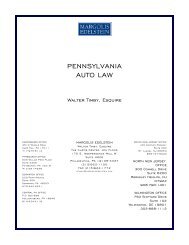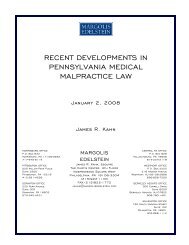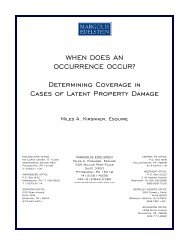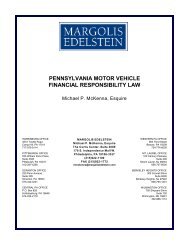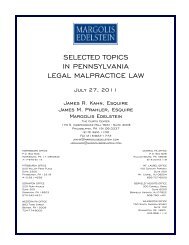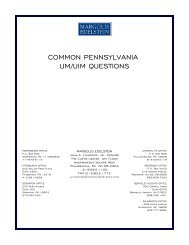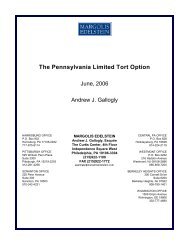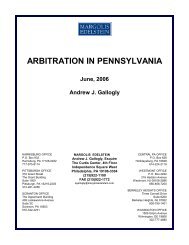Commercial General Liability Coverage Exclusions Under
Commercial General Liability Coverage Exclusions Under
Commercial General Liability Coverage Exclusions Under
Create successful ePaper yourself
Turn your PDF publications into a flip-book with our unique Google optimized e-Paper software.
of the particular insured seeking coverage. <strong>Coverage</strong> remains in force for innocent co-insureds who<br />
did not themselves intend the injury. Conversely, policies excluding coverage for the intentional<br />
injuries of “an” or “any insured” are interpreted as barring coverage to all insureds if any one of them<br />
engaged in the excluded conduct. <strong>General</strong> Accident Ins. Co. of America v. Allen, 708 A.2d 828<br />
(Pa.Super. 1998).<br />
• For this exclusion to apply, the insured need not act with the “specific intent” to cause the<br />
precise injury or damage which in fact resulted; it is sufficient if the insured expected or intended<br />
to cause injury or damage of the “same general type.” United Services Automobile Ass’n. v.<br />
Elitzky, 517 A.2d 982 (Pa.Super. 1986), appeal denied, 528 A.2d 957 (Pa. 1987).<br />
• For the exclusion to apply, the resulting injury must have either been intended, or it must<br />
have been “substantially certain” to follow from the insured’s conduct. It is not enough that the<br />
insured should have reasonably foreseen the injury which his actions caused. Id.; Erie Insurance<br />
Exchange v. Fidler, 808 A.2d 587 (Pa.Super. 2002). The law is not fully developed regarding the<br />
extent to which this principle can result in a finding of coverage where the victim suffers an<br />
improbable or “freak” injury due to an insured’s intentional actions, such as permanent brain damage<br />
from a punch in the nose.<br />
• The Pennsylvania courts have held that an intent to cause injury will be inferred as a matter<br />
of law in cases involving particularly reprehensible acts such as engaging in sexual relations with<br />
minors, but have not extended that rule to other contexts. Aetna Casualty & Surety Co. v. Roe, 650<br />
A.2d 94 (Pa.Super. 1984); Erie Insurance Exchange v. Claypoole, 673 A.2d 348 (Pa.Super. 1996).<br />
• Although the courts do not use the phrase “inferred intent” in cases outside of the sexual<br />
molestation of minors context, it is also well established that an insured is chargeable with<br />
knowledge of the natural and obvious consequences of his actions, and will not be permitted to argue<br />
that he had no intent to cause them. For example, in Donegal Mutual Ins. Co. v. Ferrara, 552 A.2d<br />
699 (Pa.Super. 1989), in which the insured intentionally kicked a policeman in the crotch, but denied<br />
the intent to injure him, the court held that injury to the officer’s genitals was substantially certain<br />
to result from the insured’s actions and that an intentional injury exclusion barred coverage. This<br />
concept has also been employed frequently in gunshot cases.<br />
• An insured’s voluntary intoxication may be considered in determining whether an injury is<br />
subject to this exclusion. Nationwide v. Hassinger, 473 A.2d 171 (Pa.Super. 1984). The question<br />
of the requisite level of intoxication necessary to avoid application of the exclusion has not been<br />
clearly established, though in one case in which this issue was addressed, the insured purportedly<br />
suffered from a complete, alcohol induced “blackout”. Stidham v.Millvale Sportsmen’s Club, 618<br />
A.2d 945 (Pa.Super. 1992). The Superior Court also recently suggested that the level of intoxication<br />
necessary to avoid application of an intentional injury exclusion might rise to the level of a “total<br />
lack of consciousness” in Donegal Mutual Ins. Co. v. Baumhammers, 893 A.2d 797 (Pa.Super.<br />
2006), reversed on other grounds, 938 A.2d 286 (Pa. 2007).<br />
2



